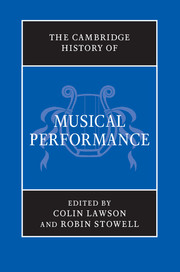Book contents
- Frontmatter
- PART I PERFORMANCE THROUGH HISTORY
- PART II PRE-RENAISSANCE PERFORMANCE
- 7 The Ancient World
- 8 Performance before c. 1430: an overview
- 9 Vocal performance before c. 1430
- 10 Instrumental performance before c. 1430
- 11 Case study: Guillaume de Machaut, ballade 34, ‘Quant Theseus / Ne quier veoir’
- PART III PERFORMANCE IN THE RENAISSANCE (C. 1430–1600)
- PART IV PERFORMANCE IN THE SEVENTEENTH CENTURY
- PART V PERFORMANCE IN THE ‘LONG EIGHTEENTH CENTURY’
- PART VI PERFORMANCE IN THE NINETEENTH CENTURY
- PART VII THE TWENTIETH CENTURY AND BEYOND
- PART VIII
- Index
7 - The Ancient World
from PART II - PRE-RENAISSANCE PERFORMANCE
Published online by Cambridge University Press: 28 March 2012
- Frontmatter
- PART I PERFORMANCE THROUGH HISTORY
- PART II PRE-RENAISSANCE PERFORMANCE
- 7 The Ancient World
- 8 Performance before c. 1430: an overview
- 9 Vocal performance before c. 1430
- 10 Instrumental performance before c. 1430
- 11 Case study: Guillaume de Machaut, ballade 34, ‘Quant Theseus / Ne quier veoir’
- PART III PERFORMANCE IN THE RENAISSANCE (C. 1430–1600)
- PART IV PERFORMANCE IN THE SEVENTEENTH CENTURY
- PART V PERFORMANCE IN THE ‘LONG EIGHTEENTH CENTURY’
- PART VI PERFORMANCE IN THE NINETEENTH CENTURY
- PART VII THE TWENTIETH CENTURY AND BEYOND
- PART VIII
- Index
Summary
The notion of ‘performance’ was central to the practice and ideology of ancient Greek and Roman societies: a politician's speech or a lawyer's closing, a choral exhibition or a sport competition were all interactive events whose fundamental components were the spectacle and its audience, both of which had an active role in the way they functioned.
This was particularly true for musical activities, whose civic and educational value was outstanding, especially in Classical Greece. Indeed, the ancient Greek culture of mousikē embraced the entire field of poetic performance to which the Muses gave their name, including song, poetry and bodily movement, all integrated within an event, which served to define culture, ethnicity and gender, and was a core element of religious and social rituals. The settings for such artistic performances ranged from entertainment in the private home to larger urban or pan-Hellenic festivals (i.e. ‘involving all Greeks’, not just a single polis), where competitive events took place in public. In these contexts the entire community, whether limited to a specific social elite or extended to the whole Hellenic society, was involved and found a common identity. These performances were thus not only a valuable means of reinforcing local individualities, but also a dynamic opportunity for exchange and interaction among different parts of the Greek world. It was through these occasions that regional identities consolidated their ‘Hellenic’ sense of affiliation.
- Type
- Chapter
- Information
- The Cambridge History of Musical Performance , pp. 207 - 230Publisher: Cambridge University PressPrint publication year: 2012
- 1
- Cited by

